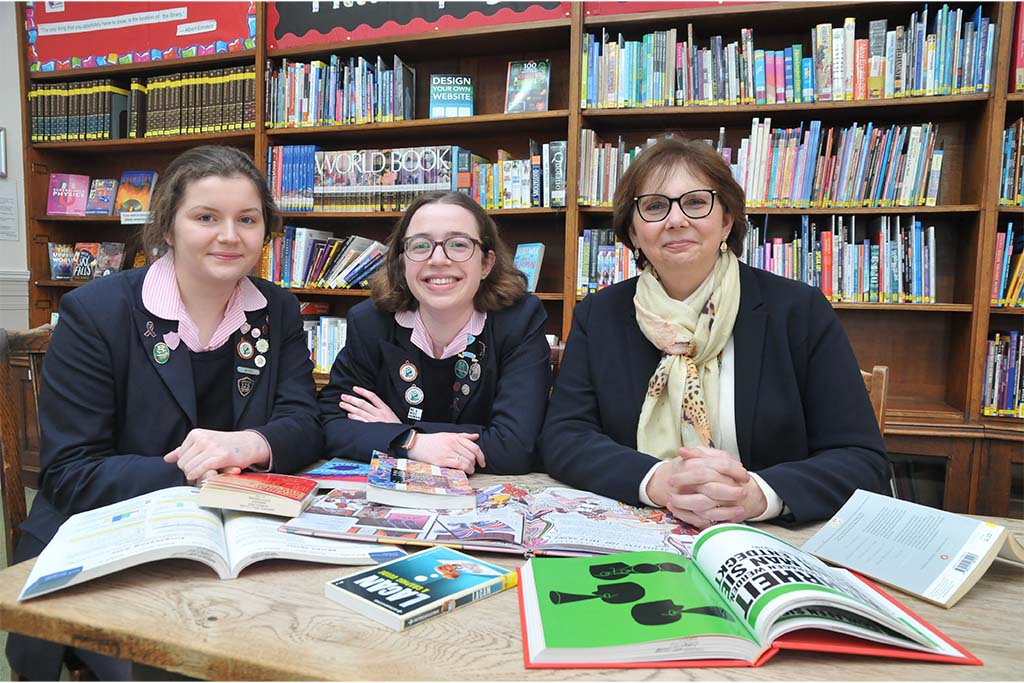ABC to A-level Exam Success
By
3 years ago


Leaving your phone in the other room while trying to revise may seem an obvious route to exam success for today’s teenagers but one leading school in Yorkshire is applying the science of how we store and retrieve information to help pupils in this year’s A-level exams.
This year’s A-level students will sit their first formal external exams since their SATS tests when they were aged 11, having missed the opportunity to practice on their GCSE exams like students normally do. Their academic performance and results will be scrutinised by Government Ministers and academic experts all over the country who are anxious to get pupils back on track after the Covid pandemic forced school closures and ongoing disruption to pupils’ learning.
Many schools recognise that a different approach to preparing for exams is vital this year if pupils are to achieve their goals and progress to the next stages of their lives, but Harrogate Ladies’ College is one of the first in the country to invest in the Ace Your Exams academic coaching programme in order to support pupils.
The Aim
Principal of Harrogate Ladies’ College, Mrs Sylvia Brett is pioneering an evidence-based programme which focuses on the importance of being in the right mindset of confidence and self-belief to achieve whatever goals.
“Setting yourself your own goals and making your own study plans isn’t new. We’re interested in how pupils learn and retain new information and how this prepares them for the challenge of A-levels in a formal setting.
“These have been exceptionally difficult times for young people and they have coped amazingly well, but we wanted to explore new techniques for our learners so they had all the tools to hand to revise and succeed,” she said.
“We know that practice is essential to learning new facts but not all practice is equal,” she said.
The Research
Cognitive psychologists all over the world have produced evidence-based research to demonstrate how you can train your brain to recall information in an exam setting.
A report by Deans for Impact says students learn new ideas by reference to ideas they already know.
“To learn, students must transfer information from working memory (where it is consciously processed) to long-term memory (where it can be later stored and retrieved). Students have limited working memory capacities that can be overwhelmed by tasks that are cognitively too demanding. Understanding new ideas can be impeded if students are confronted with too much information at once,” says the report, which sets out cognitive principles for teachers and learners.
Working with The Mindset Lab in Harrogate, the pupils underwent an in-depth programme including weeks such as ‘Goal Digger’ which helps pupils visualise their ambition, and the exam goals needed to get them there. Through learning about the power of making marginal changes students are encouraged to make alterations to their habits which build over time into big changes in results.
Testimony from Pupils
A-level student Natalie Bone said the new techniques opened a new way of learning.
“We actually have a lot of experience in learning how to revise effectively, we’ve been doing that since Year 7 really, but we didn’t get to practice this in a formal setting on our GCSEs. We were told how to think differently about how we learn and how we think and believe we can achieve our own goals” she said.
Natalie, who plans to study Law at university next year, said the spaced repetition was particularly helpful, along with other techniques such as quizzes and self-tests.
Classmate Kate Butcher, who hopes to study Criminology at Aberdeen, said the key had been understanding how to sort information in the first place.
“I’m studying in a completely different way. Partly it’s motivated me to do a lot more revision but I’m also doing things like spaced repetition which helps me remember more of what I have learned. I wouldn’t have known about this before and I feel like it’s making me ask myself more questions instead of just re-reading notes which is what I probably did before.”
The Ace Your Exams programme covers topics such as pinning your personal goals sheet above the desk, so it’s in pupils’ eyeline as they revise. It also focuses on personal organisation, an effective use of past exam papers, marker schemes and examiners’ reports, as well as encouraging pupils to believe in themselves and their abilities.
Mrs Brett, who has been Principal for over eight years, said the techniques encouraged each individual to be aware of their own revision power and that with support they could use their brains in different and more productive ways.
“Self-belief and confidence are woven through our school’s philosophy from the first day a pupil crosses the front door and a big part of the programme is devoted to personal resilience, understanding how we learn, the way you ace your exams and what we believe we are truly capable of,” she said.
Kate added: “It made me think how to work effectively – by using a red, amber, green light system in my revision guide, by evaluating my own knowledge of a topic and making sure I didn’t just keep going over the same thing.
“And it’s just the little things too which helped – revising little and often, making sure I didn’t have my phone in the room as I revised and putting aside set periods to revise. It focussed me in a new way and I think once I’d written down my goals, I felt more motivated to achieve them” she said.
The programme focuses on two main techniques. The first is ‘active recall’ or answering questions on a topic – this forces the brain to retrieve information, and research has proven it’s the act of getting information out of the brain which strengths the brain connections. Doing this repeatedly over time through ‘spaced repetition’ counteracts something called the ‘Forgetting Curve’ which helps to put more of the information into our long-term memory.
Mrs Brett added: “Believing we can succeed underpins our motivation and resilience and I know from many years in education that confidence is critical in the face of challenges and life’s joys, that’s at the heart and soul of what we want our girls to believe and achieve.”
Rachel Stuart, who runs The Mindset Lab, said “It’s been a pleasure to work with Harrogate Ladies’ College over the last two years and to hear the feedback about how the Ace Your Exams programme has helped improve students’ study skills, and their motivation to achieve their potential”
Rachel will be returning to the school later in the academic year to give pupils a ‘booster’ session to underpin their personal goals and refresh revision techniques as those important 2022 A level deadlines loom.
See Harrogate Ladies’ College’s online listing here.



